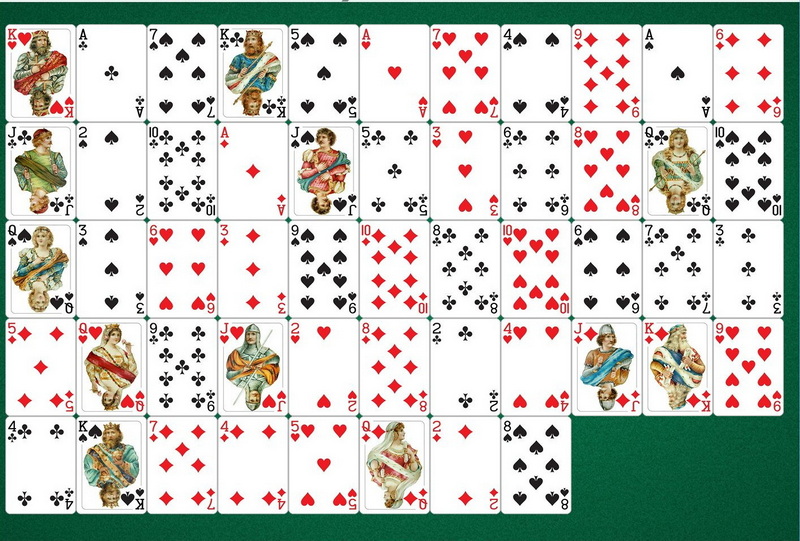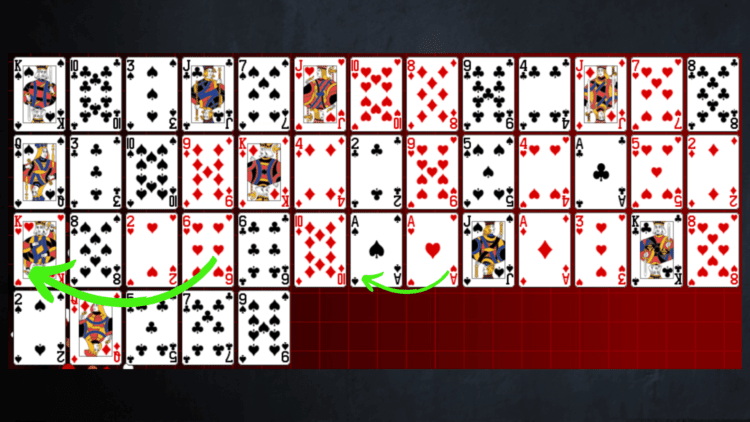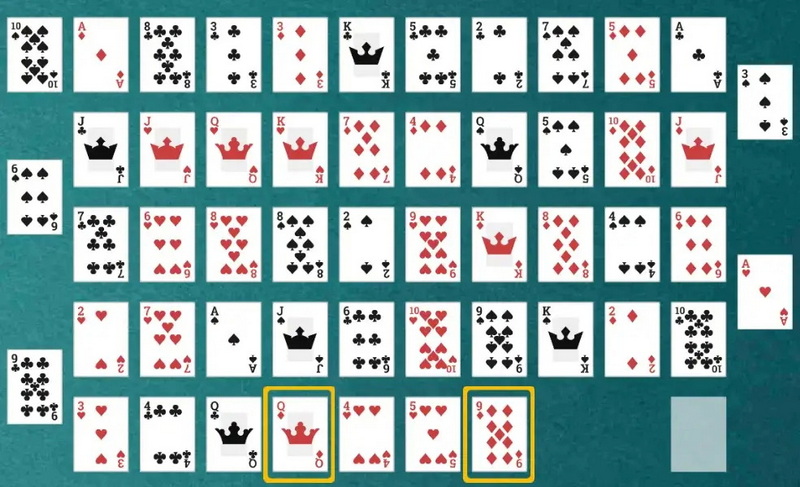Content Menu
● Objective of the Game
● Setup
● Basic Rules
● Gameplay Mechanics
● Strategies for Winning
● Advanced Strategies
● Variations of Accordion
● Tips for Beginners
● Conclusion
● Common Questions About Accordion
>> 1. What happens if I cannot make any moves?
>> 2. Can I rearrange my piles after making a move?
>> 3. Is there a way to reset or redeal during play?
>> 4. How do I know which moves are best?
>> 5. Can I play with fewer than 52 cards?
● Citations:
Accordion is a captivating solitaire card game that challenges players to strategically condense a deck of cards into a single pile. The game is named for its accordion-like gameplay, where cards are stacked and compressed, resembling the instrument's pleats. This article will guide you through the rules, strategies, and tips for mastering Accordion, as well as provide insights into its variations and common questions.

Objective of the Game
The primary goal of Accordion is to stack all 52 cards into one pile. While this may seem straightforward, achieving this requires careful planning and strategic moves. Players aim to minimize the number of piles left at the end of the game, ideally reducing it to just one. The challenge lies in the limited options for stacking cards and the need to think several moves ahead.
Setup
To begin playing Accordion, follow these steps:
- Gather Materials: You will need a standard 52-card deck. Ensure the deck is complete and shuffled thoroughly.
- Deal Cards: Lay out the cards face up in a single row from left to right. If space runs out, continue placing cards in subsequent rows below until all cards are dealt. The layout should resemble a cascading series of rows, making it easy to see all cards at once.
Basic Rules
Accordion follows a few simple rules regarding how cards can be moved:
- Stacking: You can place a card on top of the card immediately to its left or on the card that is three piles to the left if they share the same suit or rank.
- Moving Piles: When you stack cards, the entire pile can be moved as one unit according to the stacking rules.
- Filling Gaps: If a card is moved and creates an empty space, all piles to the right will shift left to fill that gap. This mechanic adds an additional layer of strategy as players must think about how their moves affect future options.
Gameplay Mechanics
The gameplay consists of turning over cards one by one and attempting to stack them according to the rules stated above. Here's how it typically unfolds:
1. Turn Over Cards: Start by turning over the top card of your deck.
2. Make Moves: Check if you can stack this card on either of the two eligible cards (the one directly left or three spaces left). If you can make a move, do so; if not, continue turning over cards.
3. Continue Playing: Keep turning over cards until all are played or no more moves are possible.
4. End Game: The game ends when all cards have been played out or when no further moves can be made. Winning occurs when you manage to condense all cards into one pile.
Strategies for Winning
Winning at Accordion requires more than just following rules; it involves strategic thinking and planning ahead:
- Identify Sweepers: Look for four cards of the same rank that are clustered near each other towards the end of your layout. These "sweepers" should be kept free from being covered by other cards until you're ready to finish.
- Plan Moves Carefully: Always consider how your current move may affect future options. Sometimes it's better not to make a move if it limits your choices later.
- Minimize Stacks Early On: Focus on reducing the number of stacks as quickly as possible without sacrificing future moves. The sooner you can consolidate your piles, the better your chances of winning.
- Utilize Gaps Wisely: Use any gaps created by moving cards strategically to open up new possibilities for stacking.

Advanced Strategies
For those looking to enhance their gameplay further, consider these advanced strategies:
- Card Counting: Keep track of which ranks and suits have already been played or stacked. This knowledge can help you anticipate which cards might come next and whether they can be played effectively.
- Visualizing Moves: Before making a move, visualize how it will affect your current layout several moves down the line. This foresight can prevent mistakes that may lead to dead ends later on.
- Practice Patience: Sometimes waiting for an ideal moment to play a certain card can pay off significantly in terms of future options.
Variations of Accordion
Accordion has several variations that can add different twists to gameplay:
- Two-Player Accordion: In this version, two players compete against each other using separate decks, aiming to condense their own piles first. This variation introduces an element of competition and strategy against an opponent's moves.
- Timed Accordion: Players set a timer and try to condense their piles within a specific time limit, adding an element of urgency and excitement.
- Multi-Level Accordion: Instead of playing with just one row, players can create multiple levels or layers of rows where they must manage several decks at once, increasing complexity and challenge.
Tips for Beginners
If you're new to Accordion, here are some tips that might help ease your way into mastering this game:
- Start Slow: Take your time during your first few games to understand how stacking works and what options are available with each card played.
- Learn from Mistakes: After finishing a game, analyze what went wrong or what could have been done differently for better results next time.
- Watch Experienced Players: If possible, observe others who are familiar with Accordion; seeing their strategies in action can provide valuable insights into effective gameplay techniques.
Conclusion
Accordion is an engaging and challenging solitaire card game that tests your strategic thinking and planning skills. By understanding its rules and employing effective strategies, players can improve their chances of winning while enjoying this classic card game experience. Whether playing solo or with friends in its various forms, Accordion offers hours of entertainment and mental stimulation.

Common Questions About Accordion
1. What happens if I cannot make any moves?
If no moves are available after turning over all cards, the game ends, and you must count how many piles remain.
2. Can I rearrange my piles after making a move?
No, once you make a move and stack cards, they remain in that order until further moves are made according to the rules.
3. Is there a way to reset or redeal during play?
Accordion does not typically allow for redealing once all cards have been laid out; however, you may choose to start anew after finishing a game.
4. How do I know which moves are best?
Assess each potential move based on how it affects your ability to stack future cards while keeping your sweepers accessible.
5. Can I play with fewer than 52 cards?
While traditional Accordion uses a full deck, you can modify the game by using fewer cards for a quicker game or for beginners.
Citations:
[1] https://www.dummies.com/article/home-auto-hobbies/games/card-games/general-card-games/play-card-game-accordion-232979/
[2] https://en.wikipedia.org/wiki/Accordion_(card_game)
[3] http://www.solitairelaboratory.com/accordion.html
[4] https://www.semicolon.com/Solitaire/Articles/Accordion.html
[5] https://bicyclecards.com/how-to-play/accordion
[6] https://gamerules.com/rules/accordion-solitaire/
[7] https://www.bvssolitaire.com/rules/accordion.htm
[8] https://www.tiktok.com/@tabletopfamily/video/7456851772640972074
[9] https://www.youtube.com/watch?v=7CZFb2AWX8g
[10] https://www.youtube.com/watch?v=gLUxTvT59Qg
[11] https://www.youtube.com/watch?v=pXvfi8mf4YE
[12] https://www.youtube.com/watch?v=9mMP_3e5LaE
[13] https://techuonthechair.com/accordion-2-player-card-game/
[14] https://www.reddit.com/r/soloboardgaming/comments/1c7xixd/from_the_rabbit_hole_called_solitaire_card_games/































